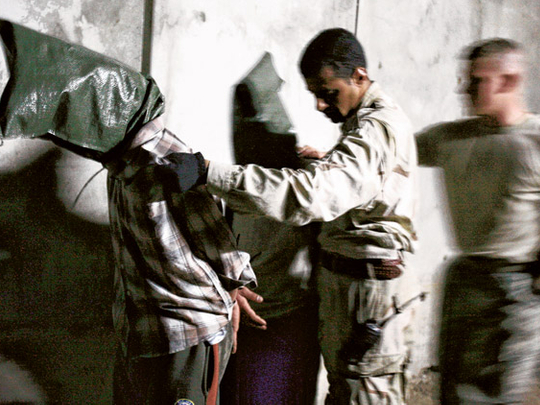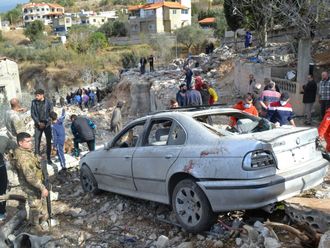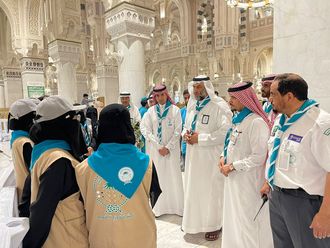
Baghdad: Prime Minister Nouri Al Maliki's move to take control of Iraqi Special Operations Forces trained and funded by the US is raising concerns over how those forces will be used, according to a new US government report released Monday.
The report by the Special Inspector General for Iraq Reconstruction is likely to further cool international enthusiasm for the incumbent prime minister, who is already grappling with WikiLeaks' release of 400,000 low-level US military documents that imply forces under his office's command committed war crimes during his four-year term.
This appears to be the first direct acknowledgment by a US agency of a move that has been widely known but so far ignored publicly by the US, which was responsible for reconstituting Iraqi forces. It could raise questions about the US role in creating an elite commando unit transferred unconstitutionally to the command of a Shiite-dominated prime ministry in the height of a brutal sectarian war.
The report by the federal agency set up by Congress to monitor the spending of billions of US dollars in Iraq also said that despite $7.3 billion (Dh26.9 billion) spent on an unprecedented police training programme, the capability of those forces is unknown because no system has been put in place to assess them.
WikiLeaks motivation
Al Maliki has claimed that the timing of the WikiLeaks release is part of an attempt to undermine his chances of forming a coalition government.
The trove of "sigacts" — the daily raw military data of "significant actions" over the course of six years of war — includes reports of security forces identified as under the command of Al Maliki's office committing crimes. None provides evidence that Al Maliki knew of abuses committed by forces answering to him. But they provide a snapshot of a savage sectarian war that included secret prisons attached to government ministries and death squads linked to security forces.
The US military has condemned the release of the documents and said it will not comment on secret files.
On Sunday, Iraq's highest court said the political vacuum which has left the country without a functioning parliament was unconstitutional and ordered lawmakers to meet in the next two weeks to elect a speaker.
Al Maliki and his political rivals have hoped to use the speaker position to entice coalition allies in a package deal to form a government, seven months after elections. Other Shiite parties have proposed that the prime minister's powers be curbed if Al Maliki leads a new government.
Since he came to power in 2004, Al Maliki has consolidated several security organisations under his command, either changing their command structures or creating new organisations that bypass the Ministry of Defence or Interior and answer directly to his office.
Those include Iraqi Special Operations Forces.
"Recent GOI [government of Iraq] decisions create concerns about whether the ISOF [Iraqi Special Operations Forces] is appropriately positioned within the GOI to ensure its independence and legitimacy," says an assessment by the Special Inspector General released Monday.
Iraqi special forces until 2006 had been part of the Ministry of Defence, a structure recommended by the US which kept the elite but often undisciplined Iraqi troops in the military chain of command. It also "protected them from political influence," the US report said.
"However starting in late 2006, the Prime Minister issued three Executive Orders that significantly changed the structure from the one that the US advisers had envisioned and recommended." The changes placed the 4,100-strong force responsible for counterterrorism directly under the command of the prime minister. An attempt to retroactively seek approval from parliament for the change was never approved.
"The Special Ops programme trained and equipped 4,100 special ops soldiers, providing essential counterterrorism capabilities," the report said, noting that the special forces were now capable of conducting operations and missions and sustaining equipment and facilities.
"But the total cost of the programme is unknown, and the extra-constitutional movement of the Special Ops forces from the Iraqi Ministry of Defence to the Office of the Prime Minister raises concerns about how the forces will be used in the future," the report said.
US assessments
In an accompanying report, the agency said the US since 2003 has spent about $7.3 billion in an unprecedented programme conducted during ongoing combat to help the Iraqi government train, staff, and equip Iraqi police forces.
"The DOD [Department of Defence] reports that over 400,000 Iraqi police have received training and are on the force. However, the capabilities of these forces are unknown because no assessments of total force capabilities were made," it read.
In lessons it said could be applied to police training programmes in Afghanistan, it also criticised weak programme management.
As the US transfers responsibility for training police from the military to the State Department next year, it also noted that the company contracted to train the police, DynCorp International, would be essentially reporting on its own performance.
"These reports need monitoring to check the validity of the information and to ensure police advisers are productively employed," it recommended.











